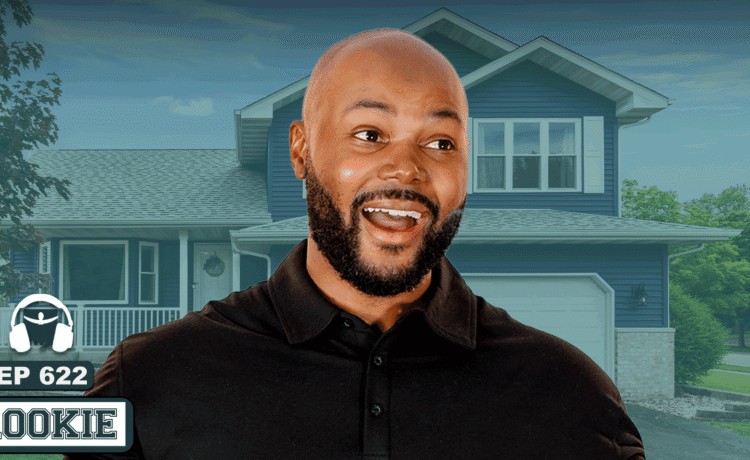Ashley Kehr:
Have you ever heard of the Burr strategy? It’s the real estate investing method that actually scales your portfolio and fast. But what if you don’t have the cash to complete it? There’s a more beginner friendly Brr R method for those without six figures, and we’re about to share it with you.
Tony Robinson:
But after you burr for the first time, chances are you’ll be paying today’s sky high home insurance costs. But don’t worry, we’ve got some solutions to lower your insurance premium so your bill stays reasonable.
Ashley Kehr:
Finally, we’re going to share the lazy method experts use to increase rents. It’s so genius that your tenants may even ask you to raise rents on their behalf. Once you hear about it, you’ll use it on every rental. This is the Real Estate Rookie podcast. I’m Ashley Care.
Tony Robinson:
And I’m Tony j Robinson. And if this video gets 100 comments, I’ll finally share my nighttime skincare routine. With all of you who’ve been asking,
Ashley Kehr:
Does it involve cucumbers?
Tony Robinson:
It absolutely does not. So with that, let’s go to today’s first question. Alright, so our first question today comes from Reese. And Reese says, I’ve heard that the Burr strategy is dead. And just really quickly, for those that don’t know, Burr stands for buy, rehab, rent, refinance, repeat. But Reese says, I’ve heard that the Burr strategy is dead unless you have huge capital, like a minimum of 50 to 80 K to start. So if a new investor has 25 to $30,000, is there a way to pool this with a small group of other investors to do a bird deal together? Almost like a small syndication. For example, if there was a property that was $100,000 and it needed $60,000 in rehab, the amount needed would be 160 K. In total. If there were five investors each putting in $32,000, that would give us a 160 K.
Then after repairs, we sell that property for two 40, each investor would get a return of $48,000. Then after repairs, we sell the property for 240 K. That would be a $48,000 profit giving each investor $16,000 in profit. And then we just repeat that process. Is this the strategy that some investors use? If so, where would I find them? Once I built up capital and learned the process, I could then do it by myself. But I think working with a small group of people might be the less risky way of doing my first few deals. Alright, so there’s a couple of questions in here and I think something that I want to clarify. The initial question talks about the burr strategy, but then you talk about going on to sell this property for a profit, which would be flipping. So in a traditional burr, you are keeping that property as a long-term buy and hold asset, right? So you’re going to buy it, renovate it, refinance, get all your capital back, rent the property out, and then take the money that you got from the refinance and recycle that into your next deal. But it sounds like what you’re saying here is just buying a property in all cash, renovating in all cash and selling that property as a flip, which is also fine, but it’s just not the burr strategy. We’re going to talk about Burr. It’s about holding that property as a long-term asset.
Ashley Kehr:
Yeah, so instead of selling the property, you would refinance the property and the goal would be to refinance it however high you could. So most banks will lend on 80% or 75% of the value, the appraised value of the home. So you would need it to appraise for more than what you actually put into it to get all of your money back. So that’s one difference with the burr is you’re actually refinancing too because you have rented out the property and in this, if you’re going to sell the property, you probably don’t want to rent it out before you actually sell it, unless this is specifically maybe a duplex or something like that where it is a rental property and not a single family because you’re really going to limit your buyer pool if you have somebody in there that’s on a one year lease and they can’t move into it as their primary residence upon purchasing it.
So the first thing I thought of it in here is, first of all, if you’re going to, there’s laws and rules and regulations against investing and pooling your money together, and if you were to get five investors, each investor would need to be active in the deal where they would need to have some kind of job, some kind of role to actually be part of the deal. It couldn’t just be four of these are just passive investors, they’re giving you your money and then your investing, they need to be active in the deal. So maybe one’s doing the bookkeeping, maybe one’s managing the contract or whatever that may be. I see this as a headache as to now you have five people, five opinions all saying how this deal should be done. So if you were going to do this, have this many partners, I would make sure it is very, very clear as to whose each person’s roles and responsibilities are and who has say and how decisions will be determined. Is it upon a vote because you have an odd number? How would that work? And just be very clear with having five different people making these decisions with this, I think you have many different options to actually do this deal instead of taking on five partners or four partners if you’re the fifth and just giving equity to them and they’re putting their cash in, there’s different ways to partner without actually having to put equity in the deal.
Tony Robinson:
Yeah, the lending I think would be a great option. But just really quickly, going back to your point Ash, about the different roles and responsibilities that folks could have to play one way I agree, the idea of five people all being equally invested from a time perspective into a deal sounds terrible to me, too many cooks in the kitchen, but I think one way to navigate that is in your operating agreement for your LLC, you can just designate that there are certain major decisions that you guys have to vote on as a group. So maybe it’s the listing price, maybe it’s the selection of a general contractor. Maybe it’s the selecting of a listing agent. If there are any seller credits, if you guys were to go and sell this property, those are the things you guys would’ve to discuss. Any material changes to the scope of work above a certain dollar amount would require a group vote.
But anything outside of those maybe you can delegate to one person and say, Hey, Tony’s going to be the point person on everything else except for these core decisions that we all need to focus on or to agree on together. And for our hotel, that’s how we did it where we have partners who brought the majority of the capital. They’re not interviewing cleaners. We’ve gone through six onsite managers. Our partners haven’t talked to any of those onsite managers, but if we were to sell, refinance or other major decisions, that’s where they’re able to come into play. So obviously Ash and I are not attorneys, so go talk to an attorney, talk to a syndication attorney specifically. I think they might have the most insight into what works and what doesn’t. But going back to your other point Ash about it doesn’t have to be an equity partnership.
Maybe you don’t even need to partner at all. In your example, you mentioned $32,000 from each investor, could you maybe save a little bit more and do this deal by yourself? If we use those same numbers on 160 K in total cost for your renovation and your rehab, call it 20% down, what is 20% of 160,000? 32,000 bucks maybe tack on another five ish percent just for capital, working capital, you’re at 40 grand give or take. So if you’ve already got 32,000, could you get another eight to $10,000 and then you can go out and maybe get a hard money loan where they’re going to cover the other 80% of what you need to do this deal. So I don’t necessarily think that maybe it’s even necessary because you’re pretty close at the numbers you’re talking about with just being able to go out and get some hard money.
Ashley Kehr:
Yeah, one thing he says in here too is that Burr is pretty much debt unless you have huge capital. And the only way that really makes sense is if you are leaving money into the deal. So if you are putting a lot of money down, then you are doing the bird deal When you go and refinance and you don’t need to pull all your money back out, then yeah, the deal is more likely to work. Anytime you put more cash into the deal, you’re more likely to get better cashflow on the deal, but it doesn’t mean your cash on cash return is actually going to be better on the deal too. So I think there’s a little confusion here as to Burr is dead unless you have huge capital because even if you are putting in the numbers are the same on the deal. So even if you infuse more cash into it, it’s just going to change what your cash on cash return is on the deal.
It’s not going to change the other numbers on the deal such as the purchase price such as what you can rent it out for, what the appraised value is. Those are all factors that don’t come into play. If you are just changing how much cash you’re putting into the deal you’re looking, you want to look at the overall numbers because Tony and I could purchase the same property and say it’s a hundred thousand dollars and I put in $20,000, and he says, well, I want the deal to work, so I’m going to put in $50,000. So he’s saying this deal, it’s not going to be dead, this spur isn’t dead because I’m putting more capital into it. And yes, okay, his cashflow is going to be more because he has a lower mortgage payment because he only has debt of 50,000. For me, I have debt of 80,000 and I have a higher mortgage payment, so my cashflow will be less. But there are other metrics who actually analyze what’s a good deal and one of those is the cash on cash return. What else could Tony be doing with that $50,000 that’s actually generating more income from him than that cashflow from that one property? So I just want to make sure that you guys know that infusing cash into your deal doesn’t always make it a better deal. There’s more metrics to look at than just cashflow on a property.
Tony Robinson:
Yeah, I think the last thing to ask that Ash is just circling back to what you said earlier about private money lending versus equity partnerships. And if you’ve got four other people who are interested in investing in real estate but don’t want to do it themselves, don’t have the cash, could you pull from some combination of those folks, all of those resources, those capital resources, and they’re just now private money lenders for you to be able to go out and do flips or burrs yourself and now you’ve got a hundred K that you can go out and redeploy over and over and over again to help you build your own portfolio and then they’re happy because they’re getting a nice fixed return on the capital that they’re lending out to you. So I don’t think that a partnership with five people is the only possible route. It is a route, but I don’t think it’s the only route that you should consider
Ashley Kehr:
Today’s show. It’s sponsored by base Lane. They say real estate investing is passive, but let’s get real chasing rents, drowning in receipts and getting buried in spreadsheets feels anything but passive. If you’re tired of losing valuable hours on financial busy work, I’ve found a solution that will transform your business. It’s base lane, a trusted BP Pro partner base Lane is an all-in-one platform that can help you automate the day-to-day. It automates your rent collection and uses AI powered bookkeeping to auto tag transactions for instant cashflow visibility and reporting. Plus they have tons of other features like recurring payments, multi-user access and free wires to save you more time and money, spend less managing your money and more time growing your portfolio. Ready to automate the busy work and get back to investing. Base Lane is giving BiggerPockets listeners and exclusive $100 bonus when you sign up at base lane.com/biggerpockets.
Okay, welcome back. Our next question comes from Sam in the BP forums. It’s 2024 and I received a renewal notice on two single family home properties with a 33% and 28% increase respectively without any claims over the life of the policy period. This is after a double digit percentage increase last year. The only two options if I want to hang on to these properties are increase the deductible change carriers to a lesser reputable carrier. Is there anything I am missing and how are you coping? Okay. I actually have an insurance thing come up recently to is just comparing policies and trying to figure out what do I actually need? Do I need some of this stuff? And then if I cut it out, am I going to regret that? And then actually this random thing that could happen actually happen because I just got one of the short-term rental policies quoted and it was double what my current insurance policy is and just comparing. And they both have completely different things that they’re each covering and it’s not even like, oh, this one has it all, this one is missing. Some of it, they’re like two completely different things. So I am also in the midst of trying to figure out what insurance I actually need and if it’s even worth increasing my deductible at this point.
Tony Robinson:
Shopping for insurance is not easy, like you said, there’s a lot of language and caveats and carve outs unless you spend a lot of time talking to your insurance agent or broker, I think it is sometimes hard to understand what you need and what you don’t need. But I think in general we’re seeing rising insurance costs as a more common reason that deals aren’t penciling out, especially in certain parts of the country. If you guys have been around the podcast for a longer period of time, you’ll remember my property back in Shreveport. The reason that we ended up needing to sell that property was because the insurance premiums like four XD from one year to the next and we shopped it around and every insurance provider that we went to gave us roughly the same quote and nothing had happened. It was our flood insurance, there was no flood, nothing had happened, the property didn’t flood, there was no flooding in and around that area, but for whatever reason the premiums went up and we made the decision to sell the property. But I think between the floods, the hurricanes, the wildfires in California insurance, it’s just more risky for the providers. And I think as we talk about scaling our portfolio or understanding where to start investing insurance just simply has to be part of that conversation in a way that maybe it wasn’t five or six or seven years ago because it is rising and there’s just not a lot of options. Unfortunately,
Ashley Kehr:
I bought this property, I ended up buying it, but I had talked to the seller before I purchased it and I asked how much he paid in insurance every year and he said he was self-insured. He said that he owned the property free and clear. I was literally buying it for like $37,000 and he’s like, I self-insure if something happens to the property, I’m going to come out of pocket and pay for it or I’ll left of the property. If it burns down then you know what, I’ll just pay to have the lot demoed and I’ll sell the lot because the lot is worth probably as much as the house was, which was pretty much true at that point. And so I think about that as to is there going to be a point in time where people do just decide to self-insure and banks and lenders aren’t going to allow you to do that.
They’re going to want you to have a policy in place and to be listed on the policy. But if you own a property free and clear, I wonder if there is going to be a transition of people who are just going to say, Hey, instead of sending my premiums in every year to this insurance company, I’m just going to keep funneling this high yield interest savings account and that is going to be my insurance policy. And then just getting maybe liability coverage on the property and not actual property coverage for that. So I dunno, it would be interesting to see the data on that as to how many people are actually self-insuring the physical property.
Tony Robinson:
I think Ash, maybe if we hit on just what can this person actually do in their situation because it is a tough spot to be in and they brought up two options. It’s increasing the deductible, which is an option. And just for folks who maybe aren’t super familiar, your deductible is what you would pay in case there were a claim and you can increase or decrease your deductible and that’ll have an impact on what your actual insurance costs are. Typically a higher deductible would lead to a lower payment in the inverse would be true where a lower deductible would lead to a higher payment. So this person is saying if they increase their deductible, the actual monthly costs or the annual premium would go down, which is an option or change in carriers, which yeah, different carriers offer different options at different costs. But I think maybe just taking a step back, one of the things that I would do is just shop around and not necessarily looking for a budget or lesser reputable insurance carrier, but if you go talk to an insurance broker and give them your profile, your property’s profile, and let them go shop around to a bunch of different carriers, I think that in and of itself would give you a better idea of, hey, lemme get some apples, apples quotes on the coverage amounts, the deductibles, what’s included, what’s not.
And maybe it is a case where every person that we go talk to, they’re within five or 10% of each other. That’s what it was for us and that was a sign that like, hey, there’s no way around these new costs, so our best option here is to sell. And maybe that’s the same conclusion you come to or maybe you go to a different carrier and you find that, hey, for pretty much the same coverage, we can cut our premium costs by 25 or 30% and undo this increase that we’re seeing. But I don’t think you’ll really know until you shop it around to quite a few different options.
Ashley Kehr:
Tony, I just pulled up an example of a quote I just got that shows the deductible options and then what the premium would change to. So for a thousand dollars deductible, the total cost would be 3,300 for a $5,000 deductible would be 2,800, but it also, it goes up then all the way up to $50,000 deductible and a cost of 2,136. I bought this property for 50,000. I’ve never taken, but I’ve renovated stuff, but still I think it’s put total 130,000 into it with the purchase and the rehab into the property. But yeah, so that just shows you, it’s almost like I think of buying points for your mortgage rate. They’ll show you like, okay, you pay two points, this is what your interest rate is. Now you pay two and a half points, this is what your interest rate is now, and you got to try to find that happy medium.
Tony Robinson:
$50,000 deductible is crazy. And that was only to save how much annually? 800 bucks. It’s like, is
Ashley Kehr:
That Yeah, yeah. Not even a
Tony Robinson:
Thousand. Yeah. Is that even worth it? But yeah, I think it’s math that they’ll have to go through. I think something else too, and I’ve never done this, but I wonder a lot of times when you shop around for your insurance, they’ll ask you questions like, Hey, what’s the age of the roof? When’s the last time that you replaced this thing? Do you have a pool? Do you have this? Do you have that? Maybe just making sure that your insurance provider has the most UpToDate information because if you bought these properties and like Ash you said you bought it for 50, you invested another 70, $80,000 into the rehab, you probably improved a lot of the things that insurance companies might lose sleepover. And if you say like, Hey, did you actually know we’ve replaced a roof last year? Did you know that we added this thing or that thing?
Or did you know that we filled in that pool That was you guys were worried about just making sure they’ve got an accurate picture of the current property and any improvements you’ve made. Sometimes that can reduce the cost as well. Or maybe sometimes it’s the simple fact of removing something that could reduce your insurance premium. And I’ll give you guys an example when we, two different examples actually one time where we did do what they want us to do in the other time where they didn’t, but when we launched our hotel, the previous owners used to let guests rent bicycles for free. It was just like a perk of staying at that hotel is that you got bikes you could ride around and every insurance carrier that we got said, that’s a huge liability for us. So you guys can keep the bikes if you want, but your premium is going to go up by X percentage.
And we said, Hey, it’s fine. Let’s just get rid of the bikes. It’s not that big of a deal. At one of our single family Airbnbs, we have a slide that goes into the pool and the initial carrier that we were going with, they were like, Hey, we like everything about this property. Here’s the quote, but we actually won’t underwrite you if you keep the pool in place. And we’re like, well, or if you keep the slide in place and we’re not getting rid of the slide. So we went to a different carrier who charged us more to account for the fact that there was a slide going into the pool. So sometimes you can ask the carrier like, Hey, is there anything that I can remove from this property that would allow me to bring my premium costs down as well?
Ashley Kehr:
Yeah, that’s one thing I’ve learned is what do carriers like and don’t like in your area? And you can talk to your insurance broker about this as to what are red flags, like wood burning stoves, row houses, trampolines. These have all been things that have been red flags on my insurance or will increase the premium. So things they won’t land on and things that will increase the premium I think is also great starting point and not only for your current property, but when you’re looking to buy properties in the future of knowing what an insurance carrier would like and what they don’t like too, I think can go a long way with helping you keep that insurance cost down.
Tony Robinson:
Ash, just really quick because you said the word trampoline and I just found this out yesterday. If I say Q-tip, Q-Tip is a brand name, but it’s actually called a cotton swab. If I say, I don’t know, jacuzzi. Jacuzzi is a brand name, but it’s actually called a hot tub, right? Trampoline, do you think? Is that the generic name or the brand name?
Ashley Kehr:
Well now I don’t think that I thought it was the generic name, but now I’m not. And also Jacuzzi. I did not know that was a brand name because my kids literally asked me the other day and I was like, I think it’s something with the Jets or something like they’re two different ones. Ja
Tony Robinson:
Jacuzzi is a brand name, but trampoline is also the brand name. I want you to try and guess what the generic name is for trampoline. Those are all great guesses, but not correct. It’s a rebound Tumblr, never in my life anyway. Trampoline’s a brand name. So maybe just you were today years old when you found that out for all our Ricky said, you’re listening.
Ashley Kehr:
People study brands of Apple and different things. People need to be studying jacuzzi and trampoline as to how to become a household name.
Tony Robinson:
Alright, so we’re going to take a quick break before our last question, but while we’re gone, be sure to subscribe to the real estate rookie YouTube channel. You can find us at realestate Rookie and we’ll be back with more right after this. Alright guys, let’s jump into our last question. This one comes from Jimmy and Jimmy says, I have a three bed, one bath family house, which is rented at $1,400 per month. The current comps in the area are around 2000 to $2,500 per month and I should be able to easily get that amount. My current tenants have been there for almost 10 years now and they always pay on time. In fact, they’re usually several days or even one week early paying the rent. They are great tenants and rarely ever have a maintenance call and small stuff they just take care of on their own.
And don’t even charge me or let me know. I’ve already went a couple of years without even talking to them. I’ve been slowly raising the rent like 50 bucks a month every year, but it’s still way under market value by at least 500 to a thousand dollars a month. It’s an old house and does have its flaws, which is expected on a 100 plus year old home. But what would you do or how much should I raise rent at renewal? It’s a yearly auto renewal lease. Alright, so we’re talking about raising rents and what’s the best way to do this, Ash, I’ll defer to you here. Obviously you’ve got a lot more experience than I do when it comes to raising rents on folks. I think that just from there’s some level of value that we should give to peace of mind as a real estate investor, and you said you’ve gone a couple of years without even talking to them.
How much is that silence worth to you? And maybe it’s not a thousand dollars, but maybe it’s 500. So maybe instead of raising the rent by a thousand bucks, you raise it by 500 or maybe you raise it by two 50 on their next renewal. But I think there’s something to be said about the peace of mind that comes along with having great tenants who don’t say anything, don’t make a fuss, and they just pay their rent on time and leave you alone. And maybe you can go out there and get that a thousand dollars premium that you’re looking for, but if it now requires you talking to that tenant every month and they’re always complaining about something, you’ve got the vacancy you have to worry about of like, okay, they’ve been in it for 10 years now you’ve got to go and maybe renovate this place to get it up to standards to be able to run out at the amount you’re asking. Is it worth all of that? And is there a better way to maybe meet in the middle with these tenants where you both kind of give what you want, they get to stay at this place, they’ve been out for a decade, maybe slightly under market rents. You get to keep these amazing tenants, but you get a little bit closer to what it would demand on the open market. So just my initial 2 cents, but I’m curious what your thoughts are, Ash.
Ashley Kehr:
Yeah, I always like to include the market rent in the area and show them here are comparable markets in this same area and this is what they’re going for. So example, if their rent is $800 per month, everybody else is paying nine 50. So not only are you having $150 per month increase, but you’re having to pay moving costs, you’re having to switch all utilities, you’re having to forward your mail. There’s a lot that actually goes into moving besides just paying new rent. So just the convenience of being able to stay where the person is. I really try to capitalize that and to show them that I’m still very competitive. I’m not trying to overcharge them. And if there is a drastic difference in the rent, sometimes I’ll do the step up method where it’s like, okay, let’s start with a $50 increase for three months and then we’ll go to a hundred dollars increase and keep doing it that way.
So it’s over time. I do that mostly for inherited tenants where I’m taking over the property and their rent is below market value already instead of just this big shock of here comes a mean old landlord raising our rents right away. I try to do it a little bit over time because there always is that fear factor. Your property that you’re living in as a rental, it’s selling and you have no idea. Sometimes when I’ve gone and looked at properties, you can see the terror in these tenants face not knowing are they going to be asked to leave? Is their rent going to increase? Who is going to buy it and what’s going to happen? It has to be a really, really scary and uncomfortable feeling. So I try to not be first impressions I think are always a very, very big thing. So I try and just do the step up thing instead of just slapping ’em like $500 right now.
So you could always do that over time. And with putting the market rents, they’re going to see that even if they move somewhere else, they’re going to be paying the same amount unless they find a great deal somewhere. So that’s kind of how I handle it. But I 100% agree about the points of if they are great tenants, take care of the property, you don’t really hear from them, they don’t have issues, they don’t put in a ton of maintenance requests because they’re actually taking care of the property if someone’s putting maintenance requests in and it’s actually legitimate things and not just them trying to nitpick at things that have literally been there the whole time they’ve lived there and all of a sudden one day when they get a rent increase, they’re deciding to bring it up to your attention. But I think that’s a good starting point.
And also think about it too, you can give them options. So you could do, here’s a one year lease with $800, here’s a two year lease at seven 50. So you could even lock them in longer showing them like, okay, you can actually, I’ll increase it by just a little bit if you are going to actually stay in the property for another two years. But I’ve had a tenant that has lived in a property for, let’s see, it’ll be nine years, I think right now, nine years. And I’ve never raised their rent once because they have always paid on time. It’s like a different unique property to me that I want to keep forever. I never want to sell it. And they take great care of it, and they have paid the same amount of rent every time, and they’ve stayed there for the whole nine years. And there’s never ever, ever been an issue.
Tony Robinson:
We’ve interviewed Dion McNeely a couple of times in the podcast, and I really like his approach where he puts the onus on the tenant to say like, Hey, what do you feel is a fair amount? You’re currently at $1,400 a month in rent. Here’s five properties that are within walking distance of your unit that are renting at $2,500 a month. This is a big gap. What do you feel is the best way for us to address this? And he said, a lot of times they’ll end up saying a number that’s higher than what he even thought. So I think just showing them the facts and letting them kind of lead that conversation is always a good way to go. But yeah, for me, peace of mind, I think there’s a lot of peace of mind that comes along with great tenants. So I would try and hold onto ’em as long as you can.
Ashley Kehr:
Thank you guys so much for joining us. Make you’re subscribed to our YouTube at realestate Rookie and you’re following us on Instagram at a BiggerPockets rookie. We’ll see you guys on the next episode of Rookie Reply. I’m Ashley Hughes. Tony, thanks so much for joining us.
Help us reach new listeners on iTunes by leaving us a rating and review! It takes just 30 seconds and instructions can be found here. Thanks! We really appreciate it!
Interested in learning more about today’s sponsors or becoming a BiggerPockets partner yourself? Email [email protected].








Recent Comments